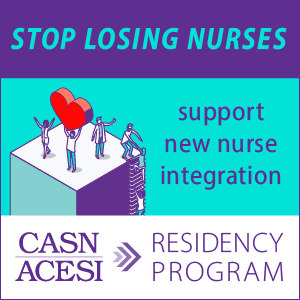home » Programs » Residency Program » Participate for FREE
 Cost for participation in the CASN Nurse Residency Program (Curriculum, Workshops, CNEI Preceptor-Mentor Training, and Competency-based Evaluation Rubrics) starts at $10,000* annually, plus $200 per preceptor-mentor course attendee. *This does not cover the preceptor-mentor release time costs. There is no cost to nursing graduates.
Cost for participation in the CASN Nurse Residency Program (Curriculum, Workshops, CNEI Preceptor-Mentor Training, and Competency-based Evaluation Rubrics) starts at $10,000* annually, plus $200 per preceptor-mentor course attendee. *This does not cover the preceptor-mentor release time costs. There is no cost to nursing graduates.
Normally, costs for participation are paid by the health care institution (the employer), however, thanks to a funded research project from Health Canada, the first 20 employers, their staff nurses, and new nurses can participate for free.
To take advantage of this ($10,000+) opportunity employers and nurses participate in the program evaluation & research component, which includes the following:
This vital research adds to understanding the value of nurse residency programs and encourage their implementation at health institutions across Canada.
Contact Jodie Lachance for further information.
In April 2023, CASN received C$2.4 million from Health Canada contribution agreement for the funding of an initiative supporting Canadian research and development of a National New Nurse Residency Program.
The national nursing education initiative, which will be in effect until March 2027, aims to support the retention of newly licensed registered nurses (RNs) in Canada’s health care workforce by enhancing their competence and resilience and reducing job stress.
The implementation of the CASN national, bilingual Nurse Residency Program, in partnership with 15-20 employers (e.g., acute care hospitals, health authorities, specialty hospitals, long-term care centres) across Canada, will allow for evaluation research to be conducted to provide Canadian evidence on the effects of a national residency program on the clinical competence of recently licensed RNs, including the reduction in the level of stress they experience during their transition into practice, and their integration and retention into the nursing workforce. It will also include an economic analysis of the costs and benefits of such a program given the current high turnover of nursing staff.
For information about the program, contact CASN’s Don Flaming at dflaming@casn.ca.
